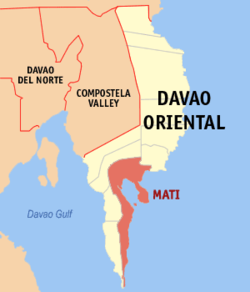Mati, Davao Oriental
| Mati | ||
|---|---|---|
| Component City | ||
| City of Mati | ||

Capitol Hill
|
||
|
||
| Nickname(s): "Coconut Capital of Mindanao" |
||
 Map of Davao Oriental with Mati highlighted |
||
| Location in the Philippines | ||
| Coordinates: 06°57′N 126°14′E / 6.950°N 126.233°ECoordinates: 06°57′N 126°14′E / 6.950°N 126.233°E | ||
| Country | Philippines | |
| Region | Davao (Region XI) | |
| Province | Davao Oriental | |
| District | 2nd District of Davao Oriental | |
| Founded | 1861 | |
| Incorporated | 1903 | |
| Cityhood | June 16, 2007 | |
| Barangays | 26 | |
| Government | ||
| • Mayor | Carlo Luis P. Rabat (PDP-LABAN) | |
| • Vice Mayor | Glenda Rabat-Gayta (PDP-LABAN) | |
| Area | ||
| • Total | 588.63 km2 (227.27 sq mi) | |
| Population (2015 census) | ||
| • Total | 141,141 | |
| • Density | 240/km2 (620/sq mi) | |
| Demonym(s) | Matinian | |
| Time zone | PST (UTC+8) | |
| ZIP code | 8200 | |
| Dialing code | +63 (0)87 | |
| Income class | 5th city income class | |
| 112509000 | ||
| Electorate | 73,912 voters as of 2016 | |
| Website | mati |
|
Mati is a 5th class city and capital of the province of Davao Oriental, Philippines. According to the 2015 census, it has a population of 141,141 people. It is located on the south-eastern side of Mindanao, Residents of Mati are called Matinians.
Mati is politically subdivided into 26 barangays. In 1957, the barrio then known as Cabuaya was renamed to Dawan.
Mati comes from the Mandayan word Maa-ti which refers to the town's creek that easily dries up even after heavy rain. Pioneer settlers were tribes Kalagan, Mandayan, and Maranao which carried strong Arabic and Indo-Malayan influences.
Captain Prudencio Garcia, the pioneer political-military head in 1861, and his comrade Juan Nazareno founded Mati and two other towns in Davao Oriental. By 1903, Mati was declared a municipality by virtue of Act No. 21. By 1907, Act No. 189 further reaffirmed the establishment of its local government. Francisco Rojas was the first appointed mayor while the first elected mayor was Patricio Cunanan in 1923. Mati became the capital of Davao Oriental in 1967.
The Japanese Imperial forces landed in town and occupied most of eastern Davao region in 1942. Mati was liberated in 1945 by the Allied Philippine Commonwealth troops of the 6th, 10th, 101st, 102nd, 103rd, 104th, 106th, 107th and 110th Infantry Division of the Philippine Commonwealth Army, 10th Infantry Regiment of the Philippine Constabulary and the Davaoeño guerrilla units. Mati celebrated its grand centennial in 2003.
During the 11th Congress (1998–2001), Congress enacted into law 33 bills converting 33 municipalities into cities. However, Congress did not act on a further 24 bills converting 24 other municipalities into cities.
During the 12th Congress (2001–2004), Congress enacted into law Republic Act No. 9009 (RA 9009), which took effect on 30 June 2001. RA 9009 amended Section 450 of the Local Government Code by increasing the annual income requirement for conversion of a municipality into a city from ₱20 million to ₱100 million. The rationale for the amendment was to restrain, in the words of Senator Aquilino Pimentel, "the mad rush" of municipalities to convert into cities solely to secure a larger share in the Internal Revenue Allotment despite the fact that they are incapable of fiscal independence.
...
Wikipedia


